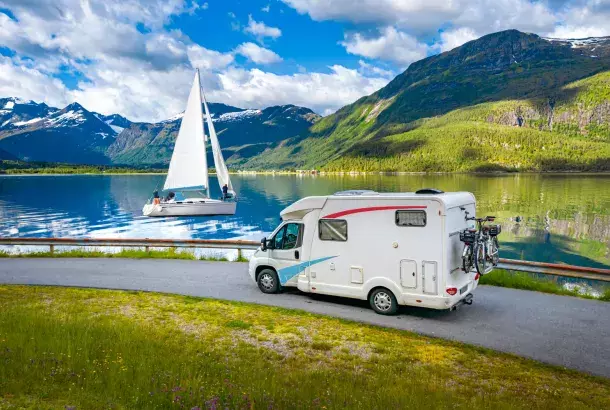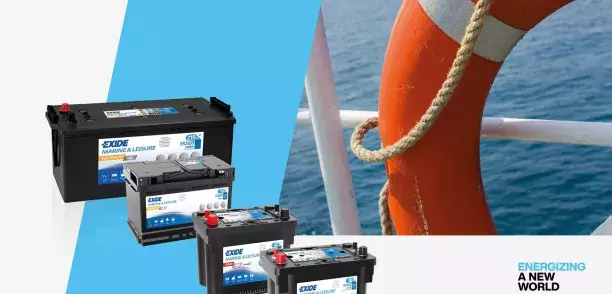- Good battery maintenance optimises its performance and extends its lifespan
- Recharging system should be based on battery type and usage
- Exide’s energy calculator simplifies selection of the right battery
Gennevilliers, France – (June 11, 2021) – Exide Technologies (www.exidegroup.com), a leading provider of stored electrical energy solution, is helping consumers and retailers make the most of its Marine & Leisure battery range with tips for the new season. This includes guidance on battery selection, battery recharging, battery maintenance and how to store batteries to maximise lifespan.
|
Marine & Leisure battery maintenance tips • Check voltage periodically to assess state of charge • Avoid sparks and ensure good ventilation during and after charging • Check for damage or loose connections – tighten if necessary to prevent loss of voltage • Clean terminals and connectors to prevent current drainage • Check electrolyte level for water consumption and top up as required • Disconnect the battery in case of prolonged periods with no use |
Marine and Leisure batteries are designed for boats, mobile homes and caravans, so they are often used seasonally or occasionally. But batteries can degrade when left unused for extended periods. All batteries self-discharge when at rest, which can permanently reduce their lifespan and energy storage capability. Following the tips outlined below will help keep batteries in optimal condition for use and maximise their lifespan.
Take charge of battery lifespan
To prevent batteries from degrading, it’s recommended that you recharge them fully before leaving them to rest for any extended time. Batteries are not inert material like steel or plastic – they have chemical components that change over time, even when not in use. This natural degradation can be slowed or prevented through periodic maintenance.
Always ensure your battery is properly charged. Marine & Leisure batteries are not designed for total discharges, and in fact this reduces their lifespan and energy storage capability. To avoid this, these batteries should always be recharged when OCV falls below 12.5V.
When a battery is deeply discharged, an external charger will be needed to restore its energy. Solar panels alone cannot supply the strong currents needed for charge recovery. Repeated use of batteries that are insufficiently recharged can reduce their energy storage capability and lifespan. A good recharging protocol combines periodic voltage checks with the use of a reliable charger that can fully recharge the battery. A battery tender can be a good alternative to a charger, as it ensures that overcharging does not occur.
During periods when the vehicle is not in use, always remember to disconnect the battery or make use of the disconnector switch if present. This ensures electric appliances do not continue to draw energy when not needed and is particularly important if the vehicle will not be in use for extended periods.
Designed to support life on board
Choosing a supply battery is different from choosing a starter battery. It is based not on the vehicle or vessel but on how the onboard power supply will be used – how much electrical energy will be consumed and how long you’ll be away from a recharging point. It is vital to choose the right battery for your needs. Having insufficient stored energy is inconvenient at best, and life-threatening in the case of a boat without access to its navigation and communication systems.
A unique advantage of Exide’s supply batteries is their specification and labeling in Wh (watt-hours) rather than the traditional Ah (amp-hours). This makes it much easier to calculate the typical daily usage of onboard electrical equipment, and therefore to select the right batteries for your power needs. Exide’s energy calculator demonstrates this process: www.exidegroup.com/eu/en/battery-finder/leisure/boat
Smart stock management strategies
Batteries are best stored in a cool (0–25°C), dry, well-ventilated environment free from sparks and frost. If you have a stock of batteries, use a suitable system such as FIFO (first-in, first-out), to minimise the time that any battery spends in storage. It is important to check voltage periodically, especially for flooded batteries.
Battery self-discharge is influenced by room temperature. The warmer the storage space, the faster the self-discharge, and therefore the more frequently recharging is required. At the other end of the scale, conventional lead-acid batteries are sensitive to sub-zero temperatures when deeply discharged. In this state, the electrolyte can freeze, ruining the battery.
For this reason, it is strongly recommended that conventional lead-acid batteries be fully recharged before resting over winter. Exide AGM and GEL batteries are not susceptible to the same freezing effect, so these are a good option if they are suitable for your vehicle’s needs.
Batteries at rest should be kept clean, and not just for appearance’s sake. Dust, oil and moisture can accumulate on a battery to form a conductive layer that drains small current from the positive pole to the negative. Over time, this contributes significantly to self-discharge, decreasing battery power. Keeping the top of batteries clean helps minimise this current.
Exide has a well-earned reputation for its Marine & Leisure battery range. As an original-equipment manufacturer, it also supplies high-quality aftermarket batteries to meet users’ needs. Exide’s M&L range comprises Exide Start, Start AGM, Dual, Dual AGM, Dual EFB, Equipment, Equipment AGM, Equipment GEL, and Equipment Li-Ion. The range includes products that are approved by DNV, the highest endorsement available for a marine-market product.





